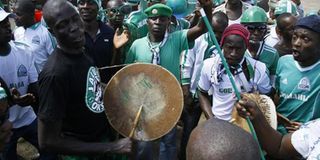Local clubs need to rethink the idea of match ticketing

Gor Mahia fans drum up support for their team ahead of the Caf Champions League first leg match against Congolese club AC Leopards at the Nyayo National Stadium on March 15. 2015 FILE PHOTO | MARTIN MUKANGU |
What you need to know:
- Club officials need to raise their game.
- It is unacceptable to sell tickets for a major Champions League tie on match day.
You have to admire the effort of those enthusiastic Gor Mahia fans who launched the ‘Operation Jaza Stadi’ (let’s get the crowds into the stadium) initiative before the Champions League clash with AC Leopards of Congo.
The project did not succeed for the simple reason that the administrators of local clubs are yet to enter the modern age and don’t understand how to draw in the plentiful Nairobians with time on their hands who would have enjoyed coming to that big match.
I was keen on attending the game but when I called a friend to inquire how to get a ticket, around Wednesday, he had no idea and promised to check.
I went on to the Gor Mahia FC Facebook page and discovered, on Friday, that tickets would go on sale on match day. That is no way to attract crowds into the stadium.
In this day and age not too many people want to wake up on a Sunday to go and jostle in a long queue for tickets at Kenya Cinema or, worse, to travel all the way to the stadium without a ticket and then line up for one.
Club officials need to raise their game. The old excuse they readily offer that tickets might be pirated belongs in 1995, not 2015.
ELIMINATE THE PIRATES
In this day and age, you just need to attach a bar-code on the tickets and you will eliminate the pirates.
It is a bit like Kenya Airways announcing they will only sell tickets at the airport because they are worried about fake tickets.
Gor and other club officials have much to learn from the example of the organisers of major rugby tournaments or the numerous concerts that compete for attention on such occasions (Yvonne Chaka Chaka, after all, was performing at precisely the same time as the Gor match and tickets for the Koroga festival went on sale weeks ahead of the concert with numerous billboards around town meaning you couldn’t miss all the promotional material)
The result of making it hard to buy tickets at convenient points such as supermarkets is that you end up keeping away ordinary fans and draw in only the especially fanatical supporters which is not enough as we saw at Nyayo Stadium.
The secondary effect, of course, is that the club is starved of the steady source of income from large crowds which would help it pay players better and on time and improve the team’s chances of making a mark on the continent.
If Gor Mahia or AFC Leopards officials offered full annual season’s tickets to fans at maybe Sh18,000 to cover home matches and then gave those fans certain privileges, for example, they would easily lock in a steady flow of funds.
It is unacceptable in these times to sell tickets for a major Champions League tie on match day.
********
After giving the Champions League match a miss, I made it to the Gor Mahi vs Bandari encounter which was an entertaining affair that offers some hope that Kenyan football can be salvaged with a bit of rational management.
Twahir Muhiddin, the Bandari technician, has always been one of those coaches who like their teams to play the ball on the floor and his team were enterprising in the first half before fading badly in the second half.
Their star player Shaaban Kenga mirrored the team’s progress lighting up the pitch in the opening section of the match before going missing in the second half.
Frank Nuttall’s men, in turn, are consistently impressing with a brand of calm, controlled football and in Michael Olunga, who was bright throughout playing as a second striker, they have a gem.
He played well during the Under-23 clash with Egypt in Machakos and he is one for the future only if he can be guided to add goal-scoring to his armoury which now includes an ability for close control that reminds one of the great Nwankwo Kanu.
With the raw material for good performance on the pitch, club officials need to think bigger and aim to make their clubs serious, modern enterprises.
The template should be clubs like Zamalek and Al Ahly which have tapped their considerable support base to turn into major social organisations employing thousands of people and giving an outlet to thousands of young talents in games ranging from football to basketball to volleyball.
Closer home, a good example is the Saint George side in Addis Ababa which is a club in a very modern mould with first rate training facilities, staff housing units for players and good salaries which mean they can attract talent from far and wide.
Clubs such as Gor Mahia and AFC Leopards and others can do much more to establish themselves as major player on the social scene but they need to embrace modern management methods.




